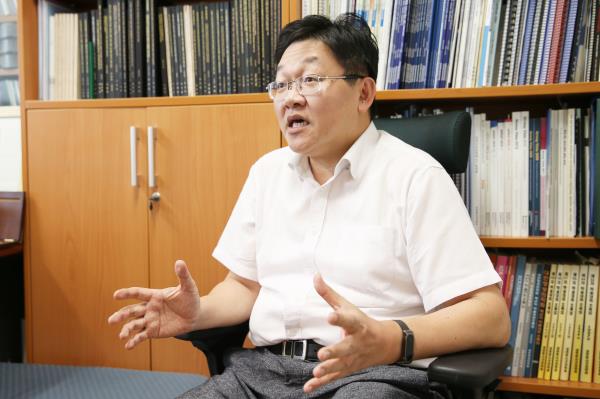Seo Joon-beom, chairman of KSAIM’s promotion committee ‘KSAIM will play a central role in this era of chaos and change the public perception of medical AI’
Experts from medical, engineering and industrial fields will gather at the founding meeting and memorial symposium held by Korea Society of Artificial Intelligence in Medicine(KSAIM) on Oct. 22 at the Grand Ballroom in COEX, Seoul.
KSAIM is established to meet the rising demands for convergence researches and industrialization based on the cooperation of medical, engineering and industrial experts, which is essential for the development of artificial intelligence.
The society will listen to diverse needs from its members and hold practical discussions that can help, emphasized Professor Seo Joon-beom, chairman of the KSAIM’s promotion committee who came up with the idea for the society as he conducted the AI Education Workshop held for the medical staff at Asan Medical Center last year. He expected KSAIM to play a central role in these times when AI-related researches, technology developments and field applications are confusingly mixed.

“The medical sector is a regulated industry. If not verified, it becomes immoral. New players who jumped into the field without acknowledging this tend to be let down due to the regulations,” Seo said. “KSAIM will play the role as the center of balance through voicing a common opinion in such an era of chaos.”
Seo pointed out that as much as KSAIM exists for convergence, it should take the role of collecting and coordinating different demands of participating experts from various fields.
“Doctors needs partners for their researches, engineers need medical data, and those from the industrial field need help in getting relevant licenses, permits and approvals. This society can collect and reorganize such demands and turn it into an official statement,” he said.
Another role of KSAIM: promoting medical AI
It is also KSAIM’s role to increase public awareness of medical AI, according to Seo.
“Medical AI may make mistakes as it is based on data produced by doctors. People understand that doctors may make mistakes, but I am not sure if people will understand that the AI may make mistakes as well,” Seo noted.
Seo added that medical AI would rise as a social issue soon, as people realize that it may also make mistakes. “In these regards, KSAIM should help people better understand medical AI,” Seo said.
“Practicing medical AI could be more difficult in Korea as we have the highest medical accessibility compared to any other countries,” the KSAIM chairman said. “While patients have greater access to medical services, however, the time they get to spend with the doctors are limited. If we develop medical AI that is good at explaining the details to the patients, it may receive favorable responses.”
AI should first be used to innovate medical devices
In the short term, medical AI should first be applied to the innovation of medical instruments and for it to be possible, industrial finance, not medical finance, is needed, according to Seo.
“Medical AI will develop, in the short term, in a way to help the writing up of medical records through voice recording or finding abnormalities in images (of CT or MRI) and writing,” he said. “It can also be applied in robot surgical devices and be used to prevent a potential mistake of a doctor. It will create added value in such forms.”
Promotion of medical AI should start with relaxing regulations
Noting that IBM’s Watson is created based on U.S. data, Seo commented that it is inappropriate to criticize that it is difficult to use it in Korea.
“Korean medical workers should it only as a reference. They should use a medical AI that is appropriately trained according to the domestic medical environment,” he said.
Seo went on to say, “Medical AI like Watson is needed in secondary hospitals or for residents, not university hospitals. The medical fee cannot be charged in current situations where medical specialists working in university hospitals put in data to check the consensus rate with Watson. We are neglecting the big paradigm.”
He stressed that it is essential for KSAIM to discover and voice on issues related to future regulations for the active development of medical AI in Korea.
“What makes the difference for medical AI is how much medical data is collected. In this process, how to get consent from the patients will be an issue. If a small module is to be developed and commercialized by collecting a hundred thousand X-rays to find chest X-ray abnormalities, for example, it is necessary to obtain consent from all hundred thousand patients,” Seo explained.
The issue of commercial consent is currently on the discussion in the U.S., Britain and China. In European countries, commercial research is included as one of the academic purposes in which the patient consensus can be exempted, Seo pointed out.
“Korea is way behind in this matter. If we cannot resolve this problem, medical AI will not be able to be used in the field,” he added.

